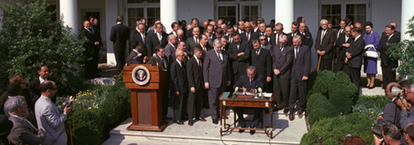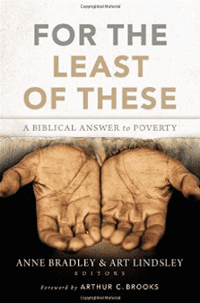 The systems (by design, default, and/or from unintended consequences) that are in place that create and sustain the conditions of poverty and our current social structures are near impossible to change. All the political and progressive rhetoric is ill-equipped to actually offer alternatives to the current conditions of poverty. Social boundaries, the ability for mobility (cultural, social, educational, economic, et al.) are mostly set in concrete, near unchangeable. Furthermore, those who have a vested interest in their own place and status (wealth, social, location, power) have no, sincere, vested interest (beyond appearance, mere rhetoric, or progressive voting) in changing the systems now in place. On the other hand, those in the bottom demographics do not have the power, do not live in geographic spaces, nor have the educational skills to make any significant change to the very complex, hierarchical-engendering, boundary rich, mobility disabling systems in place that keep most everybody in their social, economic, and cultural corners (socially, geographically, demographically, educationally, et al.) The spheres of government and of social-service (private and public) do not have the truly vested, self-less interests in making change. The appearance of change, perhaps. The rhetoric of change, perhaps. The political allegiance, perhaps. But not real, systemic changes that would actually release mobility beyond the current “corners.” When will we learn this, O Christian? Yet, as strange, foreign, and impossibly crazy as this sounds, the only space where the good life, flourishing, and even systemic social and cultural change to offer real mobility beyond our current “corners” or even truly be imagined is the gospel-rich church–literally amid local churches scattered throughout communities. Amid local churches where there is no earthly power being sought (even by its leadership), but the love of neighbor (and neighborhoods). Amid local churches where an individual’s humanity is honored, prized, and even died for is a result of believing in the gospel of Jesus Christ. This is the space, amid the early church, in which such change was nurtured and, albeit slowly, happened at the heights of the Roman empire. Where it actually outlived an empire. This is the space in which such changes have happened on small and large scales ever since. Where all lives literally matter; and, when there are lives deemed lesser, treated lesser, those lives matter more, intentionally more. The space where the hierarchies of tiered humanity are deconstructed and the alternative is constructed–that alternative is the kingdom of God, realized in Christ Jesus, and revealed through the church (literally through churches scattered in countless neighborhoods and communities). In the social and governing spheres where it takes power to make systemic changes, it will also take power to maintain such changes. And, this maintaining power is always violent. Furthermore, human nature (in the church we call it our sinful nature) will not, however, relinquish its desire for maintaining one’s advantage over others and freely disinvest its self-interests on behalf of others. So once systemic changes are make (where there is power to make such change), there will always be the powerful and powers that will seek to mark their place and status (i.e., those who make the laws have the power to enforce, by means of violence, their laws); also, there will always be those who obtained newly created social elite status, those who become affluent because of the changes and, then, will seek systems to exercise power (political and social) to maintain the new status quo (their new power). Thus, the boundaries remain and the violence to maintain them continue. This is not the way of the gospel; and, thus, not the nature of the church (read local churches scattered among communities, neighborhoods, regions). This is why the local, gospel-centered, gospel-rich, gospel-dependent, gospel-lived church is the only real space where such social change can truly be experienced. Church matters (#churchmatters).
0 Comments
 An article, “To the Poor, Poverty is More Than Material,” posted on the Institute for Faith, Work, and Economics's website lifted an excerpt from a multiauthor volume called For the Least of These: A Biblical Answer to Poverty. The lengthy quote comes from Peter Greer's essay, “A Call to Compassionately Move Beyond Charity.” I was impressed by the reflection on how the poor view themselves and it reminded me of Matthew's “Blessed are the poor in spirit, for theirs is the kingdom of heaven” (5:3). So many take Matthew's reference more broadly to mean those who have a good attitutde and recognize their “poverty” before God. You know, individuals who are humble and not arrogant. These interpretors make a difference between Luke's simple “Blessed are you who are poor" (6:20) and Matthew's “poor in spirit.” However, this is a rationalized, poor rich reading of Scripture that basically strips the poor out of “poor in spirit.” The excerpt from Peter Greer's essay gives us a basis for understanding that living in poverty is more than just a material matter and reminds us that the poor are indeed poor in spirit. In the 1990s, World Bank surveyed over sixty thousand of the financially poor throughout the developing world and how they described poverty. The poor did not focus on their material need; rather, they alluded to social and psychological aspects of poverty. Analyzing the study, Brian Fikkert and Steve Corbett of the Chalmers Center for Economic Development said, “Poor people typically talk in terms of shame, inferiority, powerlessness, humiliation, fear, hopelessness, depression, social isolation, and voicelessness.” The study highlights that, by nature, poverty is innately social and psychological . . . In my book, Wasted Evangelism: Social Action and the Church's Task of Evangelism, my definition of “social action” takes into consideration that those living with the effects of poverty are subject to systems and structures, that is the powers, that make poverty more than just material. Social action, therefore, is principally the means by which one group offers alterative means to an end for another group, taking action or advocating for action to address social issues and community life. Within the context of poverty, social action is not merely charity, alms-giving, or the transfer of wealth. It is actions taken to address relationships between the poor and the non-poor and, as well, the relationship between the poor, the social structures that can cause or promote poverty, and individuals or groups whose actions create those social structures. Social action is, therefore, associated with actions taken by individuals or groups on behalf of others, in particular advocating on behalf of marginalized or powerless individuals or groups whose access to the systems of power are limited or nonexistent. We must understanding that being poor is more than the lack of something material, but is living with the effects of poverty upon the whole person. This will help temper our judgments about the poor and why they are poor—and perhaps move us as Christians to relocate ourselves into the lives of the poor. This way we will experience and recognize what it is to be “poor in spirit.” Then, we might very will gain insight and appreciate why Jesus said, “Blessed are the poor in spirit, for theirs is the kingdom of heaven” (Matthew 5:3).
|
AuthorChip M. Anderson, advocate for biblical social action; pastor of an urban church plant in the Hill neighborhood of New Haven, CT; husband, father, author, former Greek & NT professor; and, 19 years involved with social action. Archives
February 2024
Categories
All
|
Pages |
More Pages |
|
 RSS Feed
RSS Feed